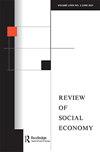Justice, ethical dispositions, and liberal socialism
IF 1.6
Q2 ECONOMICS
引用次数: 1
Abstract
ABSTRACT Social institutions that seek to realize justice must foster the moral disposition to act on the norms of justice. In order to spell out this claim, the paper turns to Hegel’s idea of Sittlichkeit (ethical life). In Hegel’s framework, the institutions of ethical life have the task of nurturing the ‘ethical disposition’, something akin to what Rawls calls the ‘sense of justice’. This task places particular constraints on institutions. The formation of ethical dispositions requires what I call an ‘internal’ transformation of the economic sphere, allowing individuals to develop their moral capacities. This stands in contrast to many theories of distributive justice, including Rawls’s, which treat the market as a ‘black box’, whose main virtue is seen in maximizing economic output. By reconstructing Hegel’s institutional suggestions systematically, it turns out that Hegel’s social philosophy offers convincing arguments for a liberal socialism.正义、道德倾向和自由社会主义
寻求实现正义的社会制度必须培养遵守正义规范的道德倾向。为了阐明这一观点,本文转向黑格尔的伦理生活观。在黑格尔的框架中,伦理生活的制度有培养“伦理倾向”的任务,类似于罗尔斯所说的“正义感”。这项任务对各机构造成了特别的制约。道德倾向的形成需要我所说的经济领域的“内部”转变,允许个人发展他们的道德能力。这与许多分配正义理论形成了鲜明对比,包括罗尔斯的分配正义理论,后者将市场视为“黑匣子”,其主要优点是经济产出最大化。通过系统地重构黑格尔的制度建议,可以发现黑格尔的社会哲学为自由社会主义提供了令人信服的论据。
本文章由计算机程序翻译,如有差异,请以英文原文为准。
求助全文
约1分钟内获得全文
求助全文
来源期刊

REVIEW OF SOCIAL ECONOMY
ECONOMICS-
CiteScore
2.60
自引率
10.00%
发文量
18
期刊介绍:
For over sixty-five years, the Review of Social Economy has published high-quality peer-reviewed work on the many relationships between social values and economics. The field of social economics discusses how the economy and social justice relate, and what this implies for economic theory and policy. Papers published range from conceptual work on aligning economic institutions and policies with given ethical principles, to theoretical representations of individual behaviour that allow for both self-interested and "pro-social" motives, and to original empirical work on persistent social issues such as poverty, inequality, and discrimination.
 求助内容:
求助内容: 应助结果提醒方式:
应助结果提醒方式:


